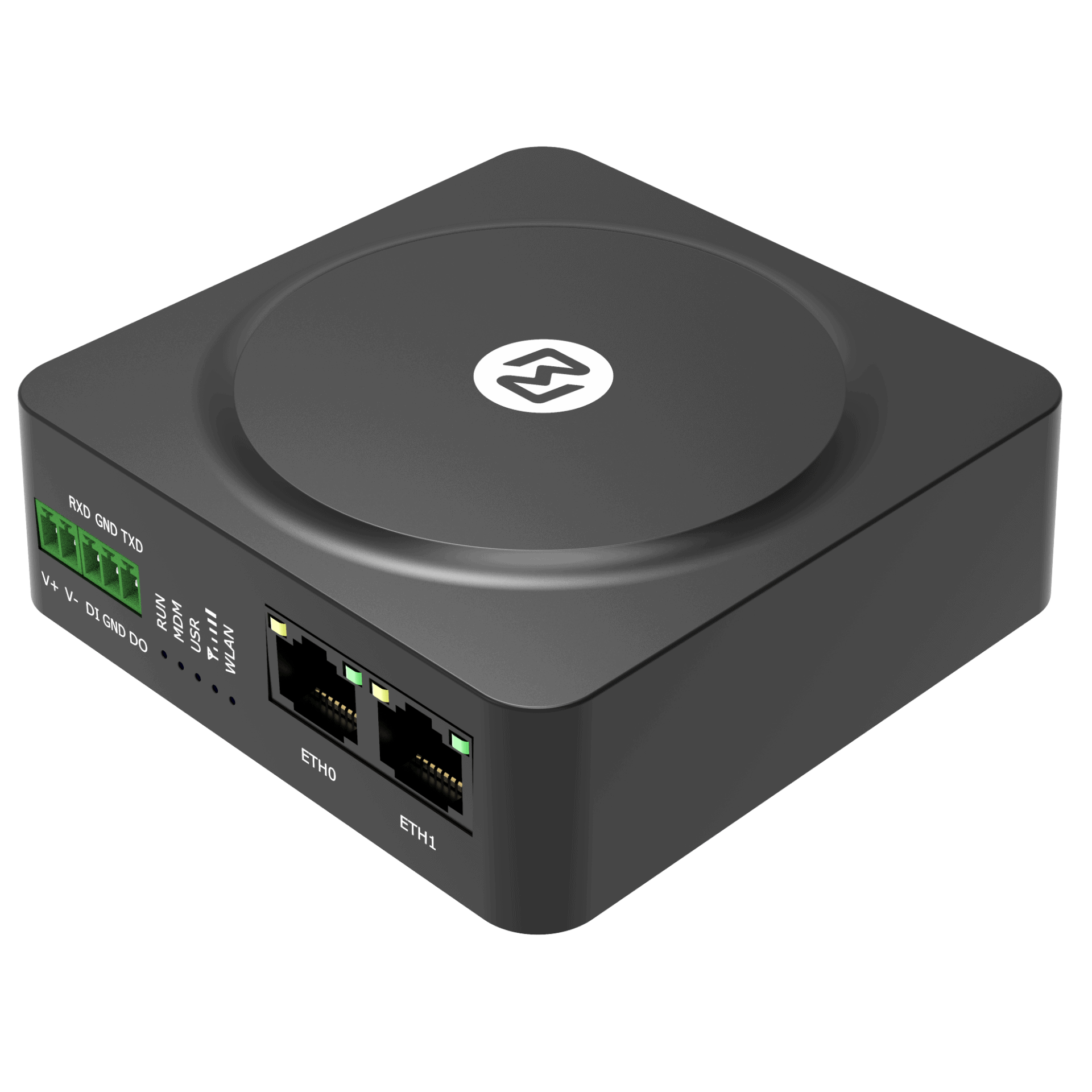Empowering Smart Water Management Systems in Turkey:
How GSL Delivers Resilient Remote Monitoring with the Robustel R1511.
Case Study – Fast Facts
Location
Turkey
Industry
Energy & Utilities, Agriculture
Product(s)
- R1511
End Customer
MGM – https://www.mgm.gov.tr
The General Directorate of Meteorology (MGM) is the Turkish State Meteorological Service, a state-owned bureau responsible for producing meteorological and climatic data for Turkey. It is overseen by the Ministry of Agriculture and Forestry and has its headquarters in Ankara.
Deployment Partner
GSL Mühendislik – https://gsl.com.tr/
GSL is a leading Turkish provider of industrial networking and communication solutions, specializing in complex deployments across transportation, energy, and public infrastructure sectors.
Challenges
Turkey’s water authorities had to monitor basins and high-altitude reservoirs spread across harsh, remote terrain. Many sensor nodes sat on buoys or hilltops with no grid power, relying on solar/battery, while GSM coverage was weak or nonexistent—breaking SCADA data continuity and forcing costly, slow field callouts.
Results
GSL deployed Robustel’s R1511 to deliver low-power, resilient cellular telemetry with intelligent failover and secure transport, restoring reliable real-time data to SCADA. Agencies report markedly improved data continuity in previously underserved zones, stronger operational resilience through off-grid uptime, reduced technician dispatches, and a scalable blueprint for future rollouts and jurisdictions.
Smart Water Management Systems at Work: GSL and Robustel Empower Turkey’s Water Infrastructure
Water is a strategically vital resource in Turkey—economically, ecologically, and geopolitically. From the drought-sensitive central Anatolian plains to the snow-laden highlands of Kars, managing this resource effectively is a national imperative. As the country accelerates its digital transformation agenda, nowhere is the need for robust, real-time infrastructure more visible than in water quality monitoring.
Since 2014, GSL, a leading IoT integrator in Turkey, has partnered with Robustel to deliver innovative connectivity solutions across energy, utilities, and critical infrastructure. Their latest collaboration focuses on deploying Smart Water Management Systems in coordination with Turkey’s top water authorities: the General Directorate of Meteorology (MGM), the Ankara Water and Sewerage Administration (ASKI), and the State Hydraulic Works (DSI).
At the heart of this project is a need for reliable, scalable, and field-ready IoT connectivity. These agencies are moving beyond reactive models—introducing sensor-based systems that collect real-time data across basins, reservoirs, and remote mountain sites. Backed by SCADA platforms and cellular telemetry, this infrastructure helps ensure environmental sustainability, public health, and national compliance with global water governance standards.
Business Challenges
Business Challenge 1: Diverse Terrains, Makes Connectivity A Problem
Turkey’s geography is stunning—but brutal for environmental infrastructure. In Ankara, water basins sprawl across semi-arid lowlands, requiring sensors to be deployed across vast, hard-to-reach distances. In contrast, the Kars region in the northeast experiences extreme winter conditions, with snow and ice covering high-altitude reservoirs for months at a time. These vastly different conditions created logistical and environmental barriers for deploying water quality monitoring systems.
Sensor nodes were installed on buoys floating in remote reservoirs—some only accessible by boat—while others were placed at altitude on rugged terrain. In both scenarios, technicians had limited access for setup, calibration, or maintenance. Traditional cabling for power or data was out of the question. The systems needed to be 100% autonomous, climate-resilient, and capable of operating for long periods without physical intervention.
This diversity in deployment sites meant that a one-size-fits-all approach was impossible. The solution needed to adapt to both mobility on water and harsh topography on land, without sacrificing performance. For Turkey’s public water agencies, ensuring nationwide consistency in water quality monitoring demanded a solution that was flexible, rugged, and technically fit for both extremes.
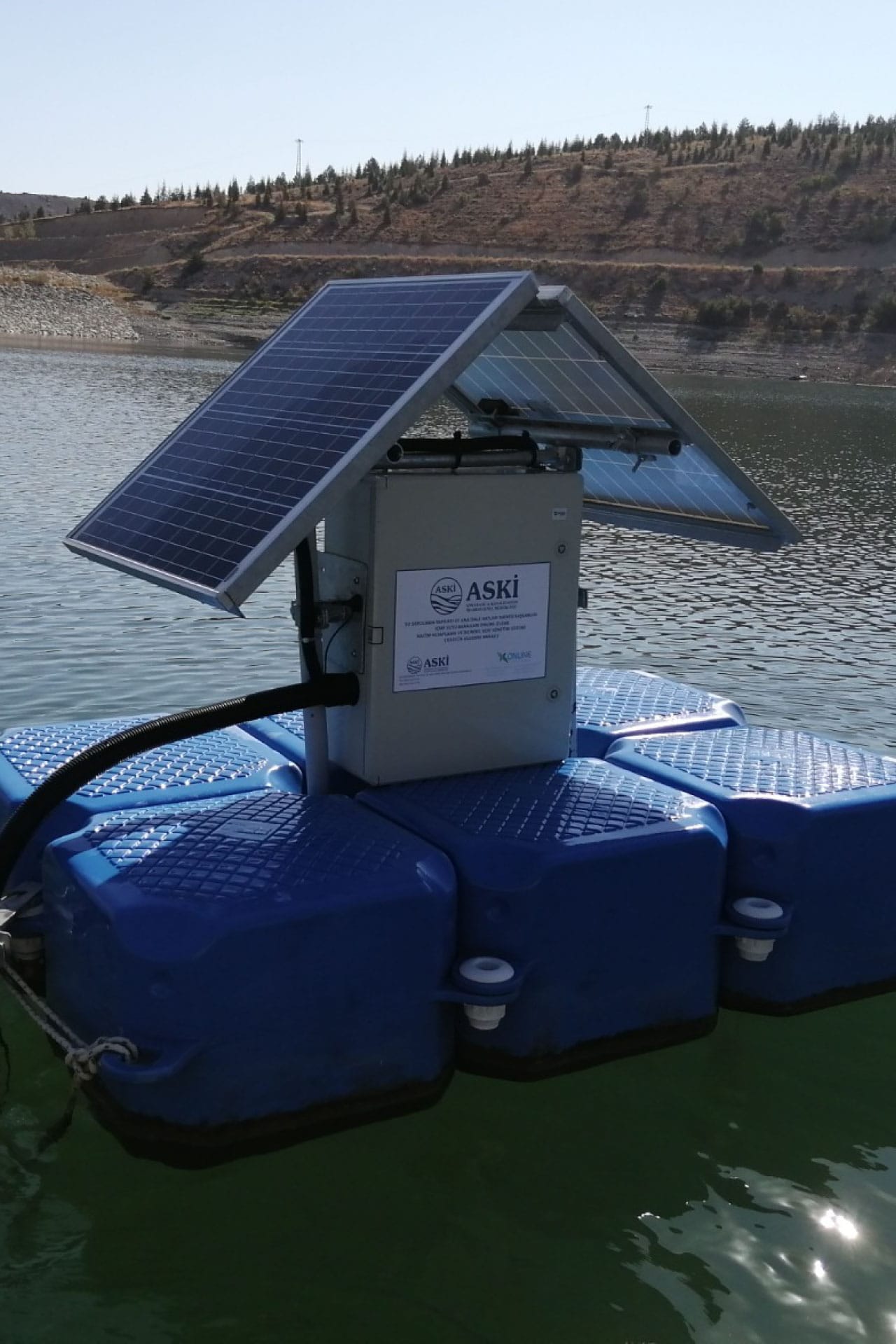
Business Challenge 2: GSM Dead Zones Threaten Data Continuity
Consistent data transmission is the foundation of modern water management—but it’s also the first thing to fail in hard-to-reach environments. Across Kars and other remote Turkish provinces, GSM signal quality ranged from weak to non-existent. Even in Ankara, known for its infrastructure investment, many basins and reservoirs fell into coverage dead zones or zones with unstable bandwidth.
This presented a critical challenge for the real-time SCADA platforms used by MGM, ASKI, and DSI. Inconsistent signal meant delayed or missing sensor data—undermining the agencies’ ability to detect contamination events, monitor pH or conductivity shifts, or comply with real-time reporting obligations. In practical terms, the system couldn’t be trusted to always “see” what was happening in the field.
Conventional routers lacked the network resilience to adapt. With no support for multi-network SIMs or intelligent failover, these devices either stalled when a signal dropped or required manual intervention to reset. This was unacceptable for a system expected to run 24/7, often unattended.
For the project to succeed, connectivity had to be not just available—but self-sustaining, adaptive, and intelligent enough to maintain uptime in the face of unstable infrastructure.
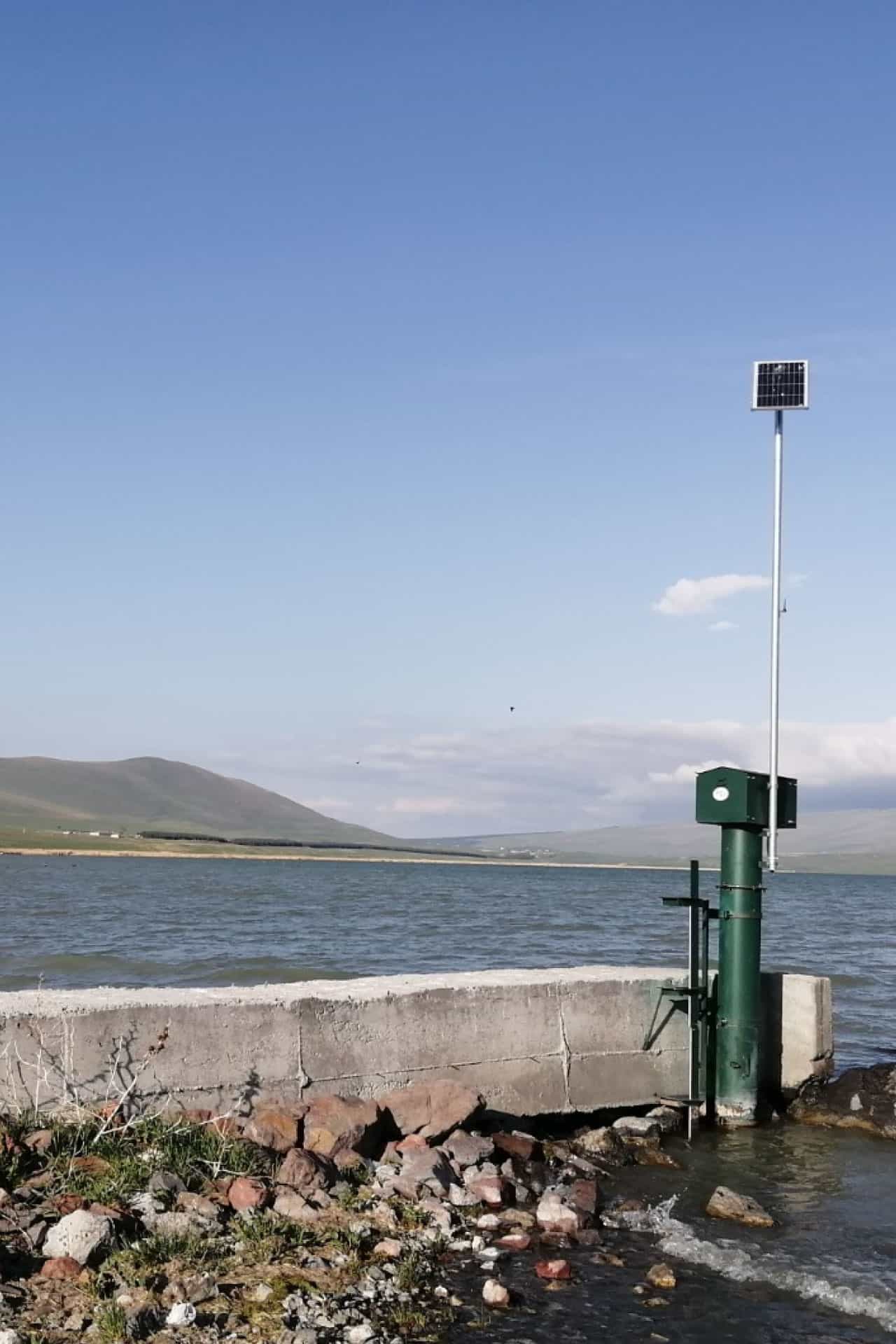
Business Challenge 3: Power Isn’t a Given
Unlike smart infrastructure in cities, rural and mountainous monitoring stations often operate far from grid power. That was the case across much of the Turkish deployment zone—where both buoy-mounted sensors and hilltop PLCs had to rely entirely on off-grid solutions like solar panels and battery packs.
The problem wasn’t just the absence of grid access—it was that earlier communications hardware simply couldn’t cope with the energy constraints. Devices consumed too much power or had poor battery management, forcing premature outages during long winter stretches when solar generation dropped dramatically.
Reliability suffered. Sensor nodes that lost power stopped sending data, disrupting environmental reporting and forcing agencies to dispatch field teams for troubleshooting. These visits were costly, slow, and—during bad weather—sometimes impossible. In remote basins, one failure could leave a critical data blind spot for weeks or even months.
Any viable solution needed to operate continuously on minimal power, tolerate variable solar input, and extend battery life as far as possible. Without this, even the best data acquisition systems would be useless in the field. Power resilience was not just a feature; it was a core operational requirement.
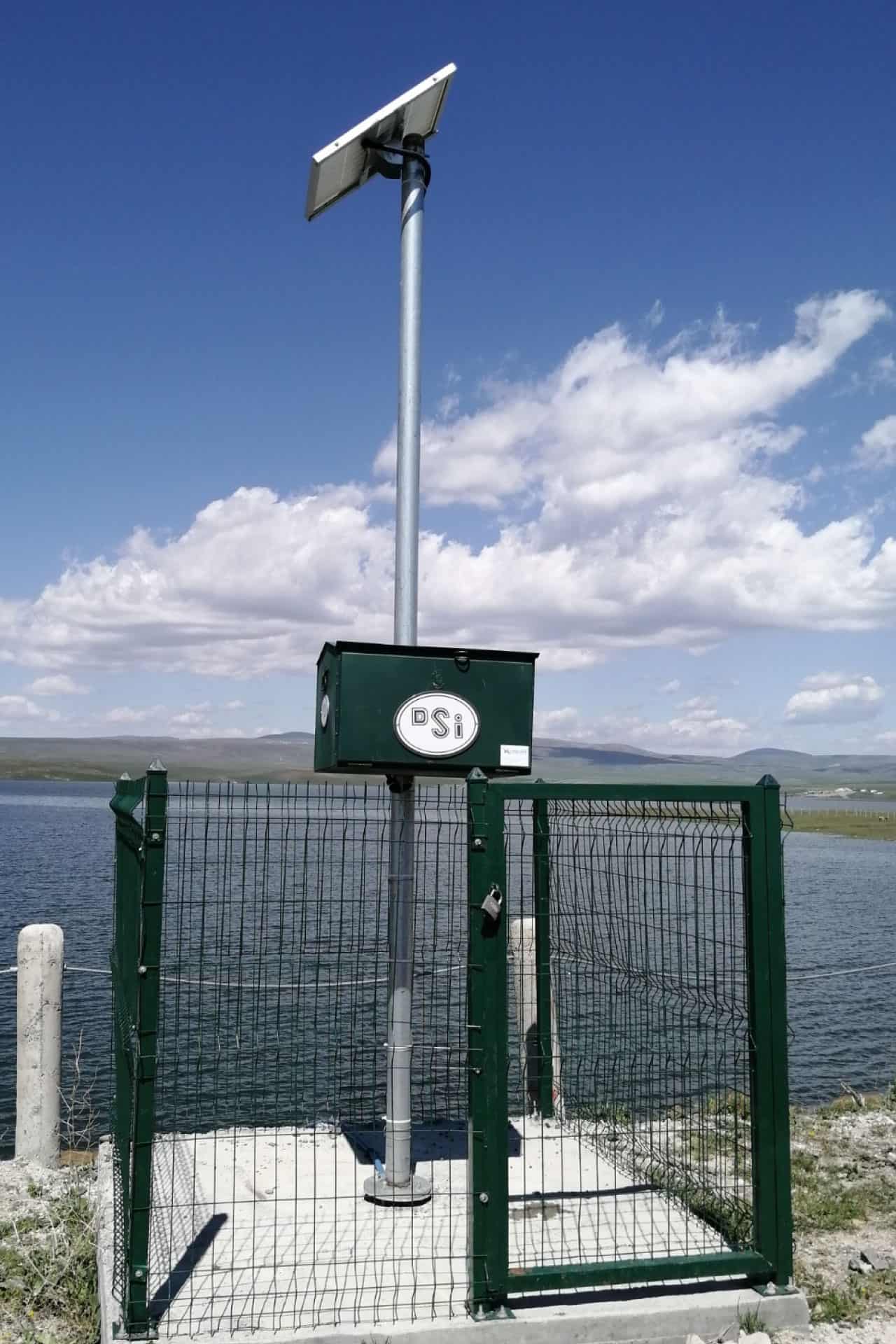
Solution Overview
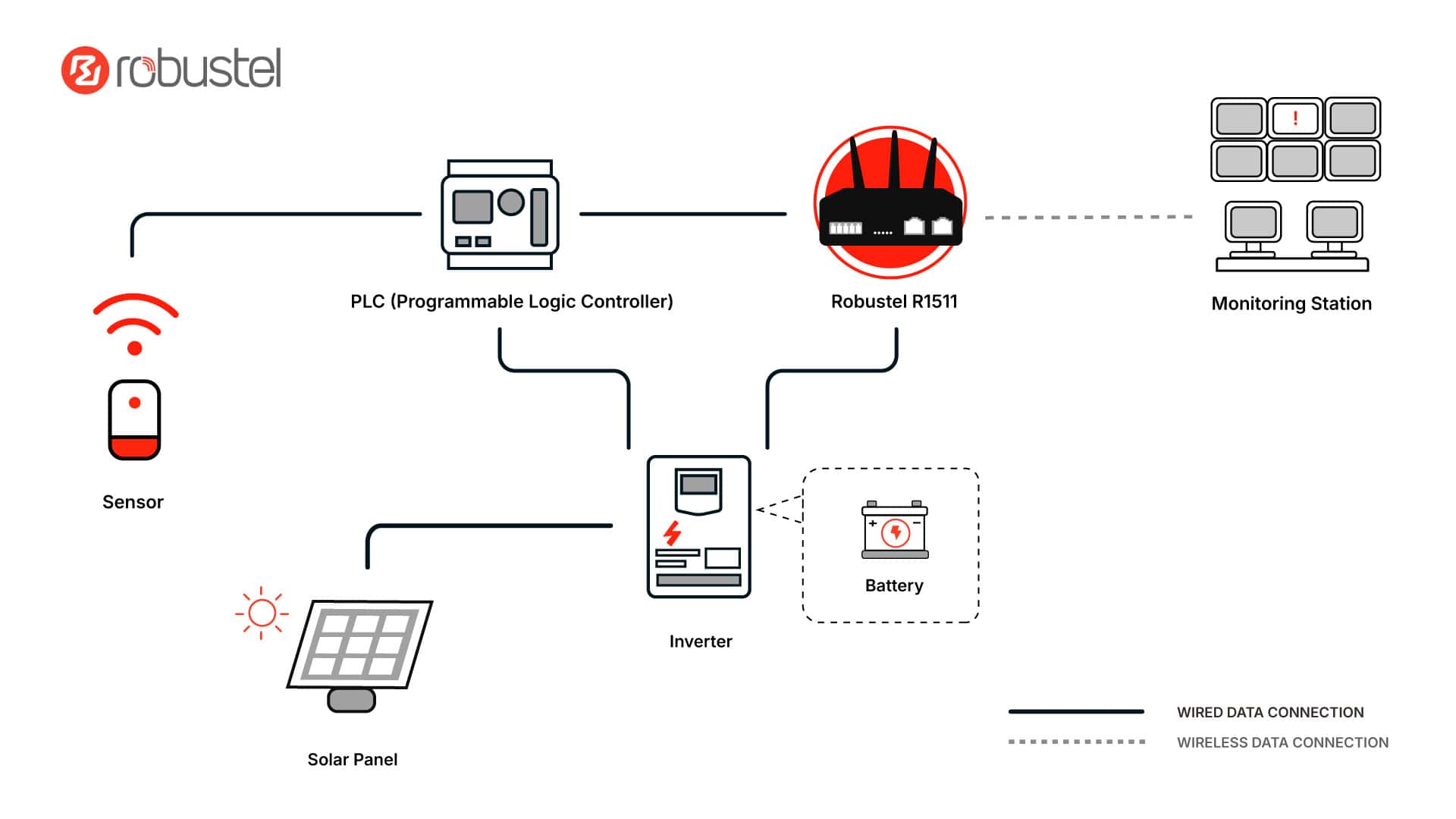
After a thorough evaluation of environmental, technical, and operational constraints, Turkish technology integrator GSL selected Robustel’s R1511 router as the backbone of the communication infrastructure. Compact, robust, and purpose-built for industrial deployments, the R1511 delivered on every requirement for Turkey’s water monitoring modernization project.
Why GSL chose the Robustel R1511?
- RS485 for Sensor Integration: At the field level, water quality sensors relay data via RS485 to a PLC, which then transmits information to central systems. The R1511’s native support for RS485 interfaces enabled seamless integration with existing industrial protocols.
- Cellular Resilience: With intelligent failover support and fallback mechanisms, the R1511 ensured that data transmission continued even when one GSM network dropped. This feature alone significantly improved uptime in Kars’s mountainous terrain, where signal conditions vary dramatically.
- Low Power for Solar Compatibility: With many sites operating off-grid, power efficiency was critical. The R1511’s low energy footprint made it ideal for solar panel and battery-powered setups, extending operational uptime without requiring larger power investments.
- Ruggedized Design: Engineered for industrial environments, the R1511 is built to operate in temperature extremes and high humidity. Its enclosure and internal components are rated for wide operating ranges, making it resilient to snow, ice, and heat.
- SCADA Compatibility: The R1511 supports a variety of industrial communication protocols, ensuring compatibility with existing SCADA platforms used by MGM, ASKI, and DSI. This minimized integration overhead and accelerated deployment timelines.
- Compact and Easy to Install: Its small footprint and DIN rail mounting options enabled fast installation in space-constrained or unconventional field enclosures. This facilitated the rapid deployment GSL needed across hundreds of monitoring points.
RCMS for Future Scaling
Robustel’s cloud-based device management platform, RCMS, can be included as a future enhancement. Once fully adopted, RCMS will allow key stakeholders to remotely monitor router status, push firmware updates, and ensure device uptime from a central dashboard, further increasing operational efficiency.
Key Outcomes
Partner-Led Deployment Success
As a Robustel partner since 2014, GSL played a pivotal role not only in solution selection but also in ensuring rapid procurement, configuration, and deployment across complex terrain. Leveraging deep knowledge of local infrastructure and regulatory frameworks, GSL’s technical team integrated RS485-based sensor data into central SCADA systems via Robustel’s R1511 routers, facilitating real-time communication with minimal power requirements.
Their expertise didn’t stop at installation—GSL continues to provide ongoing technical support, ensuring uptime and system stability across seasonal cycles. Their selection of the R1511 was driven by its industrial-grade performance and unique features, including:
- Environmental resilience in snow, heat, and humidity
- Low power draw for solar and battery compatibility
- Smart Reboot for automatic GSM reconnection
- Stable 4G/4.5G connectivity in fluctuating signal zones
- VPN-enabled secure transmission
- Native RS232/RS485 support for seamless PLC integration
Key Outcomes
- Data Continuity: Real-time data transmission improved dramatically, even in previously underserved GSM zones. SCADA systems now receive uninterrupted sensor input, enabling timely responses to environmental changes.
- Operational Resilience: The low-power R1511 maintained uptime across all deployed sites—including buoy-based systems and high-altitude stations—despite winter power limitations.
- Regulatory Confidence: Reliable, centralized monitoring now helps agencies like MGM meet environmental reporting obligations and support early detection of anomalies such as pH fluctuations or pollutant spikes.
- Scalability in Design: The modular, protocol-flexible architecture enables quick replication in other geographies or sectors—including agriculture, energy, and waste water.
- Stakeholder Trust: Authorities have cited improved operational confidence, reduced technician dispatches, and a more agile response to weather-induced threats.
Featured Products
Robustel R1511 Router
